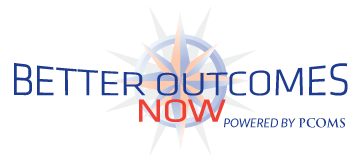April 28, 2024 06:45 PM

Our marketing consultants have been trying to get me to do a comparison between Better Outcomes Now (BON) and our competitors for a long time, as well as other “sales” related activities. “I am not a "salesperson,” I would always say, along with, “This is my life’s work.” I would often remind them of our mission:
We are on a quest to replace client-diminishing practices with client-directed ones: services that are based in a relational model instead of a medical one, are more informed by client-rated outcomes than expert opinion, best guesses, or wishful thinking, and are more guided by client preferences, culture, and ideas than theory, model, and technique. We see PCOMS and BON as vehicles for these changes.
Nevertheless, I acquiesced and decided to do a comparison between BON and our measurement-based care (MBC) corporate competitors. Saying competitors is kind of funny. We are really small compared to them. They have dozens of salespeople and programmers. We don’t have that. Rather, we have a few people who know what they are doing and believe in our mission. That makes a big difference. Our software is magnificent, very complex in what it offers but simultaneously intuitive and the embodiment of client-privileged, accountable work. But my look at us compared to others, even beyond our randomized clinical trial (RCT) advantage, found many more things in which we stand alone next to our corporate competition.
Better Outcomes Now Other Systems
|
Highly feasible, ultra-brief instruments |
Cumbersome list of varied-size measures |
|
One outcome measure for all clients* |
Multiple measures impractical and confusing |
|
Demonstrated psychometric integrity |
Varied psychometric integrity |
|
Normative standards for improvement |
Inconsistent across measures |
|
Algorithms and ETR trajectories for youth and adults, short- and long-term therapy |
Highly unlikely |
|
20+ years of implementation experience |
Highly unlikely |
|
Vast clinical experience with MBC |
Highly unlikely |
|
Conducted research supporting MBC |
No, except for one other system |
|
Ten randomized clinical trials (RCT) |
No, except for one other system |
|
System itself, BON, used in an RCT |
No |
|
Developed clinical process of MBC |
No |
|
Pioneered social justice in MBC |
No |
|
Has an evidence-based protocol for use |
No |
*BON also includes PHQ-9 and GAD-7
If you only want to flick forms to superficially meet accreditation standards, and it doesn’t matter what measure you use or how you understand the data, or even if you use the data to inform practice, then pick any system with a slick website and a smiling face. Nothing wrong with a good website, but I think you get my point. Is there substance--both knowledge and experience--behind the glitz and glamour?
But if you want to privilege clients and implement a transparent, collaborative, culturally responsive, and feasible MBC process that has been shown in peer reviewed, published studies to improve outcomes and decrease dropouts, and you want data that mean something and are supported by millions of administrations, algorithms, and ETRs, then you want BON. And if you want someone who is not a salesperson but rather who has spent their lives pursuing the above mission, contact us.





.png)


.png)